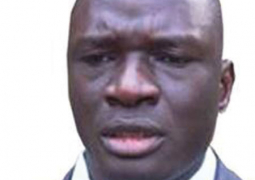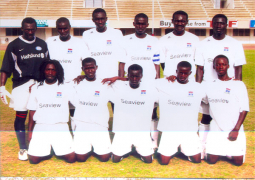The
European Union and UNESCO have handed over equipment to media houses, the GPU
and the University of The Gambia at a ceremony held at the Gambia National
UNESCO Commission grounds (at the Women’s Bureau Complex) on Tuesday 22nd
February, 2017.
As
a United Nations agency with a neutral mandate to support the fields of
communication, UNESCO has been identified for the implementation of the
journalism and media project of the EU’s governance programme, contributing
approximately D35 million to the media reform in The Gambia, in order to
advance democratic governance through improving freedom of the Press and the
quality of information available to the population.
The
primary beneficiaries of this project include media houses: newspapers,
community radios, the Gambia Press Union, and the University of The Gambia in
the framework of an ongoing initiative implemented by UNESCO to reinforce the
capacities of Gambian media professionals.
The
items included digital recorders and cameras, desktops, laptops, printers, external
data storage and photocopy machines.
Speaking
at the handing-over ceremony, EU Ambassador Attila Lajo said a critical,
independent and investigative press is the lifeblood of any democracy. He
quoted the South African moral icon, Nelson Mandela, who said: ‘’The press must be free from state
interference. It must have the economic strength to stand up to the
blandishments of government officials. It must have sufficient independence
from vested interests to be bold and inquiring without fear or favour. It must
enjoy the protection of the constitution, so that it can protect our rights as
citizens.’’
Ambassador
Lajo noted that the EU is fully committed to supporting the new government in
creating and developing the ‘New Gambia’.
He
expressed gratitude to all the partners and beneficiaries who actively
participated in bringing the project to a success.
“I
am very confident that this project will be extremely useful to support the
democratic change in The Gambia,” the EU ambassador added.
The
Director of UNESCO regional office for West Africa based in Dakar, Mr
Gwang-Chol Chang, in his remarks noted that receiving and imparting
information, both offline and online, is a cornerstone of democracy, good
governance, and rule of law.
At
this time of change and transition in The Gambia, the need for quality
information has never been so important. Access to information is a fundamental
freedom and part of the basic human right to freedom of expression,” Mr Chang
said, adding: “UNESCO looks forward to accompanying the ministry and The Gambia
in the fostering of a dynamic media landscape.”
He
further said that they also planned to offer training in May for members of the
Gambia security forces on freedom of expression and the safety of journalists
in line with the framework of the UN Plan of Action on the safety of
journalists and the issue of impunity, ensuring that security forces understand
the vocation of journalists and their shared mission to ensure access to
information to the Gambian public.
He
noted that quality journalism enables citizens to make informed decisions about
their society as it also works to expose Injustice, corruption and the abuse of
power.
Mr
Chang registered his profound gratitude to the European Union for their
continued support and confidence in UNESCO, and reiterated their full
commitment to reinforce, by providing the necessary tools and training, the
capacities of Gambian media professionals on and offline and to foster
professional journalism, freedom of the press, freedom of expression, and
access to information in The Gambia.
The
permanent secretary at the Ministry of Information and Communication
Infrastructure, Fatou Kineh Jobe, extended her ministry’s appreciation to the
European Union and UNESCO for the kind gesture and contribution to the media
houses, as well as to the education sector.
She
urged media houses, the Gambia Press Union and the University of The Gambia to
take full advantage of the equipment and the training offered to enhance their
work towards responsible journalism.
The
UNDP representative, Ms Ade Mamonyane Lekoetje, said the project will ensure
that the UTG School of Journalism and Digital Media and the GPU are equipped to
deliver professional curricula; and to have functional media houses, for
journalists’ partnership built on regular dialogue, trust, professionalism and
transparency.
Nana
Grey Johnson, dean of the University of The Gambia school of Journalism, and
Saikou Jammeh, Secretary General of GPU, both expressed gratitude for the items
and promised to make good use of them.
The
EU project will also contribute to the achievement of the 2030 development
Agenda’s goal (SDG 16) to promote peaceful and inclusive societies for
sustainable development, provide access to justice for all and build effective,
accountable and inclusive institutions at all levels.



